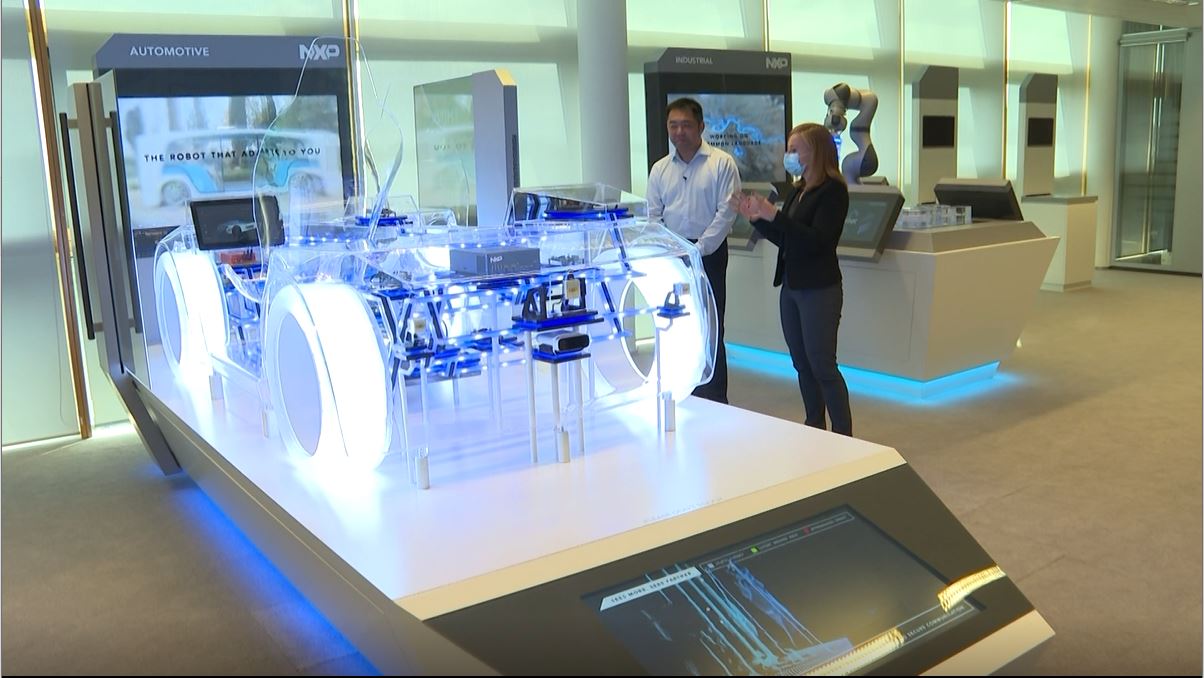02:52

It has often been said that cars these days are computers on wheels. Under the hood, there are hundreds of electronic control units (ECUs), essentially the brains controlling everything from the breaks and headlights to the latest gadgets such as parking cameras and radar.
None of those comforts and conveniences would be possible without semiconductors – the tiny chips that make modern-day electronics tick.
"Ninety percent of the innovations in the automobile industry actually come from the electronics and the chips are the soul of the electronics," said Robert Li, vice president and general manager, PL driver and energy systems, NXP Semiconductors, one of the world's largest chip manufacturers.

Innovation in semiconductor technology will be key to solving some of the biggest challenges facing the EV industry, including range and charge time. /CGTN
Innovation in semiconductor technology will be key to solving some of the biggest challenges facing the EV industry, including range and charge time. /CGTN
Li said next-generation chips could help solve some of the most pressing issues facing the EV industry, such as range and charge time, by making batteries more efficient.
"Typically, if you buy a battery pack, a lot of times you can only use 80 to 90 percent of what is actually there because the measurement is not precise," said Li.
"The more high-performance, robust, safe and accurate electronics that you put in there, the more you can push that potential."
Even incremental gains in distance and charge time will matter in Europe, where EVs are seen as the linchpin to a green future. Plans are already under way to ban the sale of new combustion-engine cars by 2035, essentially eliminating one of the bloc's biggest sources of CO2 emissions.

With passenger cars accounting for 12% of Europe's CO2 emissions, EVs are expected to play a key role in helping the EU reach its goal of being climate neutral by 2050. /Reuters
With passenger cars accounting for 12% of Europe's CO2 emissions, EVs are expected to play a key role in helping the EU reach its goal of being climate neutral by 2050. /Reuters
The more immediate challenge is a global chip shortage. EVs typically require hundreds, if not thousands, of more semiconductors than average combustion-engine cars and supplies could remain tight well into 2022. While production issues have already cropped up, most experts don't expect any lasting effects when it comes to EV manufacturing and uptake.
"Every manufacturer is having to pause production on certain models and they're shuffling things around, trying to prioritize," said Sam Abuelsamid, principal analyst e-,obility, Guidehouse Insights. "I think we'll see less disruption to EVs because there is a need to get those vehicles out there, so they're prioritizing EVs."
Abuelsamid said there was also a shift taking place within the auto industry to consolidate the hundreds of ECUs into just a handful of very powerful computers.
"Down the road, we're looking at even just one or two larger, more powerful computers. This should help resolve some of the problem," he explained.
Cutting dependence on Asia
But with the vast majority of semiconductors manufactured in Asia, the chip shortage has served as a wake-up call for Europe. In her State of the European Union address in September, European Commission President Ursula von der Leyen specifically addressed the issue, saying that while demand for chips has risen, Europe's share across the entire value chain has "shrunk."
"We depend right now on state-of-the-art chips manufactured by Asia. This is not just a matter of our competitiveness. This is also a matter of tech sovereignty. So let's put all of our focus on it," she said.
Semiconductors will be key, not only to Europe's green transition, but also it's digital transformation, since they are the key component in everything from smartphones to smart cities.
Brussels is expected to present a new "Chips Act" in the coming weeks to bolster EU semiconductor capacity. But some experts have warned that trying to unravel a decades-old and deep supply chain may not have the desired results.
"Manufacturing, especially cutting-edge manufacturing, will continue to be mainly provided in Taiwan and South Korea. If you take one of these out of the equation, the value chain kind of crumbles and you lose the ability to either develop or manufacture or package chips," said Jan-Peter Kleinhans, project director for technology and geopolitics, Stiftung Neue Verantwortung.

